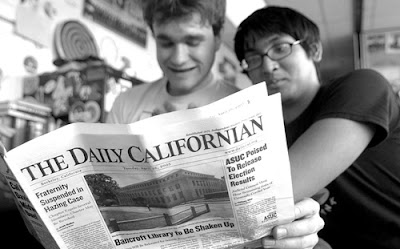 NYDIA HAN
NYDIA HAN WANTED to be a magazine writer. But after interning at a San Francisco television station while she was in college, she became hooked on TV news.
"I loved the immediacy of it," she said during her visit to class yesterday. "I really saw the power of TV news, and the ways it can contribute to the world."
Her path to becoming an anchor and consumer reporter for
6ABC's Action News, one of the most popular local newscasts in the country, was not easy. The southern California-native had/ has hints of the Valley girl accent of her youth. One potential employer told her that she had too many wrinkles on her face - when she was in her low 20s. One of her college journalism professors actually suggested she stick to print.
But she persisted. Despite the boatloads of rejection.
She landed a job in
Pocatello, Idaho. She was a one-man band there - shooting her own video, performing interviews, editing the packages and doing live shots by herself. It was tough work but working at a smaller market station taught her numerous skills and career lessons.
"At a small market station, you can make mistakes and not get fired," Han said.

She moved on to Oklahoma City where she became a
tornado-chasing news and crime reporter. She also started doing consumer affairs stories there, and that led to her next gig as a consumer reporter in Houston. She came to Philadelphia in 2002.
She finds consumer stories to be tremendously rewarding.
"You can genuinely help people," she said.
Here are a few other things she said that stood out to me:
• She said, "Don’t get into journalism if you’re just looking for a glamorous, high-paying job.”
• It can take a long time to get to the point as a journalist when you earn a high salary. At her first job, she earned $14,000 annually. She bought her clothes at Walmart.
• Crime is not her favorite thing to cover but some reporters love it. There is an adrenaline rush when covering breaking stories. And the viewers care, she said.
• In news, you might work a story all day and then right before the newscast, something else will break. You'll have to jump to the breaking story. The previous work may never be seen. It happens.
• "At the end of the day, TV news is a business, too," Han said. "We want to do good community journalism but we have to win our time slot."
• Every day, she makes phone calls to potential sources, she performs research, logs tapes, writes stories and sets up interviews. Plus, she acts as a weekend anchor and weekday fill-in anchor.
• She gets ideas for stories from emails, phone calls and on facebook.
• Her goal is to find stories that will have the greatest impact.
• Most of her stories run about 90 seconds. Some run for around 2:30. And she often begs to get an additional 10 or 20 seconds.
• She suggests you do multiple internships. And do one at a smaller market where you'll get to try numerous tasks and really be of use (you might even get on air).
• "Start looking for internships as soon as you can," Han said.
• During your internships, befriend a few reporters. Learn from them and after the internship, keep in touch with them.
• Take the initiative. Do stuff. Offer to help. Get involved!
• The future is online, she said.
• "If you plan to go into TV news, you're going to work hard," she said.
(by the way ... here is a link to
her facebook page).
 IF SOMEONE CALLS in an obituary to a newspaper, hoping to get a notice about their loved one printed in the paper, what is the responsibility of the newspaper? Should the newspaper fact-check that information, or assume that no one would joke about such a story?
IF SOMEONE CALLS in an obituary to a newspaper, hoping to get a notice about their loved one printed in the paper, what is the responsibility of the newspaper? Should the newspaper fact-check that information, or assume that no one would joke about such a story?







































